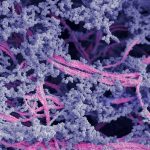Promising cancer detection blood test may not be so effective
A new blood test called Galleri, which claims to detect over 50 types of cancer, is under scrutiny.
The NHS has been testing Galleri on...
New immunotherapy offers hope for prostate cancer patients
A new type of immunotherapy using innovative nanoparticles could help men with prostate cancer live longer by preventing resistance to hormone therapy.
Researchers from the...
Study reveals hidden risks in ‘benign’ prostate cancer diagnoses
New research has highlighted the challenges of diagnosing prostate cancer accurately, balancing the risks of overdiagnosis and underdiagnosis.
Some experts have suggested reclassifying the lowest...
New discovery turns cancer’s defense into a deadly weakness
Researchers at Oregon State University have discovered a groundbreaking way to make breast cancer cells self-destruct.
They found new compounds that change a protein known...
Urine test detects high-risk prostate cancers
Prostate cancer is a leading cause of cancer death among men. Scientists have developed a urine test that could help some men avoid unnecessary...
New treatments improve survival rates in metastatic prostate cancer
Recent research from Saint Louis University School of Medicine shows significant improvements in the survival rates of men with metastatic prostate cancer over the...
Common prostate drugs may protect against dementia with Lewy bodies
A new study suggests that certain drugs used to treat enlarged prostate may also reduce the risk of developing dementia with Lewy bodies (DLB).
This...
Research finds new cause of prostate cancer development
Scientists have made an exciting discovery that could change how we treat prostate cancer. The team, led by Lukas Kenner at MedUni Vienna, has...
New discovery in prostate cancer could lead to better treatments
Researchers at UT Southwestern Medical Center have uncovered a key process that helps prostate cancer cells resist treatment.
Their study, published in Cancer Discovery, highlights...
Scientists discover HIV vaccine may also fight cancer
Researchers at Oregon Health & Science University (OHSU) have found that a vaccine originally created for HIV might also help combat cancer.
This exciting discovery...










